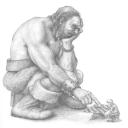Yahoo Answers is shutting down on May 4th, 2021 (Eastern Time) and beginning April 20th, 2021 (Eastern Time) the Yahoo Answers website will be in read-only mode. There will be no changes to other Yahoo properties or services, or your Yahoo account. You can find more information about the Yahoo Answers shutdown and how to download your data on this help page.
Trending News
Evolutionists?
I am constantly told by evolutionists that I am stupid because I don't believe what they believe (not all, but a lot). So let me ask some (just a couple) questions that bother me about evolution and give me your best information. Try and keep it simple, though. I'm just a stupid creationist.
Which evolved first (how, and how long, did it work with or without the others?)
-Digestive system, the food to be digested, the appetite, the ability to find and eat food, the digestive juices, or the bodies resistence to those juices?
-The drive to reproduce or the ability?
-The lungs, the throat, or the perfect exchange of gases?
-DNA or RNA to carry the DNA message to cell parts?
-The plants or the insects that live on and pollinate the plants?
-Bones, ligaments, tendons, blood supply,or the muscles to move the bones?
Just pick one and go with it unless you think you can generalize anything. I would think it to be easier to just pick one though.
Did I hit a nerve? No one even wants to try. If you don't know, just say, "I don't know. Good question. I'll email you if anything comes my way."
Obviously, I asked these questions because I believe them to be impossible to answer. How can anything that is dependent on another thing survive? Time is the "god" of evolution. I actually expected to get more of those answers.
- Alot can happen in millions... no... billions... wait, next it'll be kajillionmagillionbazillions of yrs, right?
30 Answers
- iraqisaxLv 61 decade agoFavorite Answer
If are able to see the absurdity of evolution, you have two options: you can either ignore those that believe the fairy tale of evolution, or you can try to get them to open their eyes and think about what it is they believe.
- mdfalco71Lv 61 decade ago
Hehehe...Niiiice one. I'm what you'd call an evolutionist, but I'm not a professional scientist.
As I understand it, evolution is the science of systems developing mechanisms to use their environment in a more efficient way. So I wouldn't say the digestive system evolved first, or indeed completely in one step. Animal life developed the ability to process complex proteins and use them to grow. In essence, to "eat". The digestive system as we know it developed from much simpler systems - like, for instance, those of Jellyfish or worms, which involve taking in, sucking nutrients and expelling the remainder. The "food" per se doesn't exist to be food, it just exists and is usable by other creatures AS food.
Reproduction is an interesting one - it could be said that without either the drive or the ability, it couldn't happen. However, as unicellular creatures can reproduce asexually, it appears to be a combined drive/ability in all organic life.
Lungs, as far as I know, evolved to cope with the mixture of gases that happened to be available for breathing on dry land, when the ocean-dwelling creatures took the evolutionary step to try a new environment. I refute the idea of the "perfect exchange of gases" because it doesn't work - pollute the gas mixture heavily, and our "perfect" breathing mechanism is soon compromised - try breathing carbon monoxide for a little while and see how far you get ;o) I think we simply evolved to make the most efficient use of the chemical composition of the low-level atmosphere we encountered.
DNA/RNA - don't have the answer to that one, not being a professional biologist.
The plants - any botanist will tell tell you that plants will use the most efficient method available to distribute seed and pollinate - many still wind-pollinate, with no outside agency. However, at some point, some plants evolved the capacity to attract animal life and use them to spread pollen and seeds, and a symbiotic relationship was established. But as many still don't use animal carriers, I think it's reasonable to assume this was an original state, and that animal involvement was a later evolutionary step.
Finally, interesting last point. I believe that in general terms, things evolve from simple forms to more complex ones, so I'd say muscles first - again, think of a jellyfish. Blood supply of some sort next, so as to more efficinet nourish all parts of a living system. Bones next I'd say, as they would represent a greater flexibility in food-hunting and predator-avoidance than simple muscles, and finally ligaments and tendons to develop more complex ranges of movement to enhance this evolutionary advantage.
Not, by any means, a full answer, but I hope you'll now acknowledge that an evolutionist has tried to give you a reasonable answer.
Peace.
- The DoctorLv 71 decade ago
I do not know the exact order in which these came about, but:
DNA would have come first, since this is what carries genetic information. The drive for reproduction would have come very early, too, probably very shortly after DNA came about.
A very simple digestive system would have formed after animals first developed, since animals need specialized systems to function (one of the reasons some plants, such as the Bristlecone pine can live for thousands of years, yet animals cannot, the brain can't live that long). Early animals, such as sponges and sea anemones have very simple digestive systems, mainly sucking in water and digesting whatever "things" come floating in with it. Gradually, this would have went further.
Fish came about farily early (during the Cambrian era), and they had bones, which gives structure and the ability to move around (including ligaments, tendons, etc.).
Plants came before insects as they need oxygen, and it wasn't until plants were able to grow on the soil and exchange the carbon dioxide (which plants need to grow) in the atmosphere and give off oxygen as waste. Early plants did not reproduce via insects, in fact flowering plants did not evolve until approximately the time of the dinosaurs. Even those (as some plants still do) use the wind to pollinate, insects just do a better job. Early plants could, and many still do, reproduce asexually, which is how farmers can continue to produce seedless fruits.
Lungs came about when early animals eventually gave up gills for lungs, probably when some early animal was in a position to get trapped in low water areas which dried up. Gills are not usable for breathing area, so lungs would have formed.
Hope this helps.
- novangelisLv 71 decade ago
I think cut and paste Creationists' questions are stupid. You could have found my answers to all your questions if you searched the database.
Food, the ability to find and eat food, the digestive system (which includes the digestive juices and resistance mechanisms), then the appetite. It's a typically disingenuous question, using components of one answer as entries in which came first.
Drive is a function of complex organisms (as is appetite). Reproduction dates to the start of life.
The throat existed in sea dwellers before they moved onto land, then the lungs. There is no "perfect exchange of gases" -- just adequate.
RNA, then DNA. RNA is sufficient for life and can be a genetic material (viruses) and possess catalytic activity (ribozymes). DNA is more stable and is better for storing genetic information which is why it is almost ubiquitous.
There were plants long before there were insects. Before insect mediated pollination, wind was the vector. Flowers developed to attract insects, and the two have coevolved since.
Muscles developed in free-living creatures with no need for a circulatory system. Open circulatory systems (blood is not well enough defined to fit on the list) allowed larger creatures. Tendons and ligaments evolved with increasing size, depending on the shape and complexity. Bones came last (sharks don't have bones.
- How do you think about the answers? You can sign in to vote the answer.
- SketchLv 41 decade ago
First of all, it is disingenuous of you to ask such a complex question and then ask for a simple answer. You are also asking questions that are as foolish as "How many insects are there in Florida right now.?" You will get the answer in the form that is required to respond in a reasonable fashion. Please don't try to suggest that science pretends that it has everything figured out yet and put that up as proof they are completely wrong because they can't answer all the questions out there. To do so would be making a straw man argument.(see below) I would assume, that for the sake of reasonable debate, you would have refrained from doing so. It may be easy to just say it all just happened because some supernatural being had the notion to do all this, but there is too much evidence to the contrary. Since you didn't ask a reasonable question I will reasonably and rationally focus on the most scientific research relating to part of your question.
I will chose the area that best generalizes the conversion of one system to another. .
This year scientists at The Scripps Research Institute have successfully converted an RNA enzyme (ribozyme) into a DNA enzyme (deoxyribozyme) through a process of accelerated in vitro evolution. The molecular conversion or transfer of both genetic information and catalytic function between these two different genetic systems, which are both based on nucleic acid-like molecules, is exactly what many scientists believe occurred during the very earliest period of earth's existence. This "evolutionary conversion" provides a modern-day snapshot of how life as we understand it may have first evolved out of the earliest primordial mix of RNA-like molecules-sometimes referred to as the "pre-RNA world"-into a more complex form of RNA-based life (or the "RNA world") and eventually to cellular life based on DNA and proteins. This means that similar evolutionary pathways may exist between other classes of nucleic acid-like molecules. Simply put, this is proof that RNA is the precurser to DNA.
Source(s): http://en.wikipedia.org/wiki/Straw_man - Cold FartLv 61 decade ago
The DNA will tell you what shape nose you have, the hair color, eyer color, size of the pinky and all other digits, synapse connection that will determine one's ability to learn, control emotion, vision and the other senses...
Hunters and gatherers are the oldest examples of the hunt and kill method of finding food (although sometimes plants are tasty too) and shows that even instinct alone can provide survival without communication between people, provided that one is a lone traveller. They developed the earliest ways to preserve food using salt and smoking it, and later on eat it as jerky.
The lungs and the throat I never studied and thus failed that part of biology horribly
The bones and ligaments are done with DNA as well. Attachments from bone to muscle are determined during the gestation period while baby is still in the womb. Capillaries, arteries, veins and the heart for the blood; Lungs and trachea for oxygenating the body with an air supply; stomach and esophagus for the digestive system (as well as liver, gall bladder, pancreas, small intestines, appendix, large intestine, millions of bacteria in the intestines to break down food further, and sphincter and then yeah), bladder, kidneys and urethra for the urinary system, the nervous system and the brain.... Chromosomes and DNA determine all that is to be expected in a human body although there are mutations here and there.
Mutations can be for the better, as in evolution from monkeys to humans. Mutations occur to the masses to adapt to the surrounding environments, and that includes the gigantic methane expulsion from the earth millions of years ago that was the cause of the dinosaur wipeout which caused alligators and crocodiles to breathe much less; with a much lower amount of oxygen available to breathe, they evolved into the smaller size that they are to adapt to the major atmospheric change that affected the whole world.
Hail Satan.
- BarabasLv 51 decade ago
Buddy, to start to explain any of these to you from scratch basically would require a years time and several large books plus access to a lab. If you want to believe that God created the entire universe and everything in it in six days then there is nothing that is going to change your mind.By the way. Dr. Dino will be serving a 288 year sentence for tax evasion and fraud. He will likely have lots of spare time to discuss this question with you. Why not send him a letter. I am sure he would not ask you to donate anything to his defense fund.
The drive to reproduce starts immediatly with replicating molecules. Molecules that can copy themselves do so. end of explanation. Molecules that replicate better overpoulate the area and if there is a moleculr that can use the overabundant molecules as raw material it begins to flourish. Molecular reactions increase and begin to act in concert so that two molecular reactions that supportr each other and are more important flourish. The earely stages of this process are not miracles. They are demonstrable: Look here: http://en.wikipedia.org/wiki/Miller-Urey_experimen...
So not only is there a way to study evolution as far back as anybody could ever desire but there may be a way to get to the actual creation of life.
Now doesn't that ball your underwear up in knots?
- MichaelLv 51 decade ago
If you were actually interested in hearing the answers to these questions, you would have asked in the biology section, where experts could help you.
However, the first thing they will tell you is that you are looking at it in the wrong way. You are seeing black and white; something doesn't exist and then it evolves into existence. Evolution does not work that way; all of evolution is gradual continuum that slowly diverges and becomes more complex.
Questions like the one you asked, and one of a poster below ("how did the first human baby that evolved survive without a mommy") show a shockingly enormous lack of understanding of evolution.
Spend more time researching and then address your questions to the proper audience.
Here is a great description of evolution: http://en.wikipedia.org/wiki/Evolution
If that's too dense for you, start out with a non-technical introduction: http://en.wikipedia.org/wiki/Introduction_to_evolu...
In conclusion, there are two main reasons no one has answered your question. The first is that you asked amateur scientists in the religion section, instead of seeking experts in the biology section. This is similar to the difference between asking an altar boy for a description of the Trinity and asking a bishop or the Pope for a description of the Trinity. The second reason is that your question is based on premises of evolution that are not true, so there is no way to answer the questions as posed. If you change the questions, they might be answerable.
- mulryLv 45 years ago
Professor Adjineri is incorrect lower back. (he's amazingly a guy!) you do no longer could have a scientific rationalization for something till now you should use it. If it works, you should use it. The birds did no longer have an concept of flight, yet they flew. women people did no longer understand what made cleansing soap do what it does (many nevertheless do no longer), yet they have been given their clothing sparkling besides. that's the version between a discovery and an invention. Darwin stumbled on what the animals and flora have been doing by way of time. He did no longer invent the phenomenon, he in elementary terms defined it in a fashion that made greater experience than people who wrote till now, mutually with Lamarck.
- ?Lv 61 decade ago
Here is an easier question.How could amino acids form in an oxygen atmosphere?Amino acids can be built but in order for them to form on their own you need an ammonia rich atmosphere which the earth never had.Amino acids would have to have survived in a toxic environment for quite a long time to come together DNA and RNA and would have had to do it more than once or in one way.That is why the "seed" theory is now the accepted method for the arrival of DNA onto the earth.It was supposed to have rode in on an asteroid.
- 1 decade ago
Evolution works through natural selection and over millions of years. The organisms/plants/animals/etc with the more desirable traits survive and thrive while less desirable traits eventually die off. Very minuscule mutations occur gradually as well, the useful mutations make survival easier and procreation more desirable and therefore "naturally" these genetic mutations either persevere or die off. To address one of your points, throughout enough time a certain level of what appears to be harmony between plants, animals and environments exists because those that don't adapt to their environment which include other plants, animals and environments eventually end up being eradicated naturally.
Source(s): http://evolution.berkeley.edu/evolibrary/article/0... http://science.howstuffworks.com/evolution1.htm










